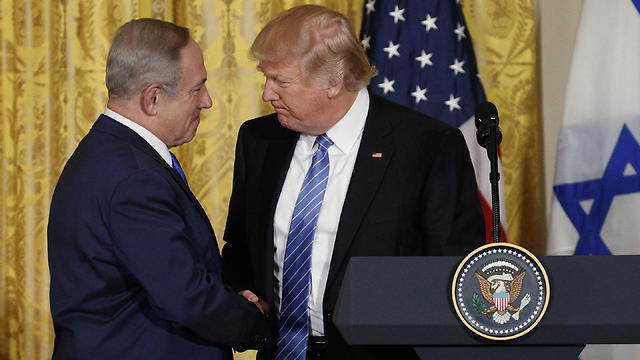Trump Promises to ‘Protect Israel’ From Syria – but What Does That Mean
ألكسندر جريفنج/هآرتس: ترامب يعد ب “حماية إسرائيل” من سوريا – ولكن ماذا يعني هذا الكلام
Alexander Griffing/Haaretz/February 10/10
Trump himself has said ‘we’re going to be there [Syria] and we’re going to be staying,’ citing a need to protect Israel. All eyes are now on next week’s contain-Iran summit in Warsaw.
President Donald Trump’s “rapid” and “full” withdrawal of U.S. troops from Syria appears to be in doubt after a week of rebukes from his fellow Republicans, U.S. military leaders, the United Nations and recently even his own admission.
Trump’s December announcement to pull out the 2,000 or so troops came as a big surprise to the Pentagon (his defense secretary quit in protest), to Israel and to the U.S. Senate – which is traditionally consulted or at the very least briefed before such decisions.
So it was equally surprising when Trump told Margaret Brennan on CBS television’s “Face The Nation” last Sunday: “We’ll come back if we have to. We have very fast airplanes, we have very good cargo planes. We can come back very quickly, and I’m not leaving. We have a base in Iraq and the base is a fantastic edifice.”
Trump spoke in a long, often incoherent interview in which he also vowed to keep U.S. troops in Iraq to “watch Iran,” adding that military intervention was still an option in Venezuela. The interview was the opening shot in a week of contradictory statements from the president on the issue.
On Monday, the Republican-led Senate passed legislation to go on the record opposing Trump’s planned withdrawal and any future plans for an abrupt withdrawal of troops from Syria and Afghanistan. The rebuke may be the biggest foreign-policy schism between the Republican leadership in the Senate and Trump thus far in his presidency.
Senate Majority Leader Mitch McConnell championed the legislation himself, which was passed as part of a larger bill. On Tuesday, he sat with hands folded when Trump declared in the State of the Union Address that “great nations do not fight endless wars,” later adding that it was time to give our “brave warriors in Syria a warm welcome home.”
On Tuesday, Gen. Joseph Votel, head of the U.S. military’s Central Command, warned the Senate Armed Services Committee of the risk of a resurgence by the Islamic State following Trump’s planned withdrawal. Votel added that a “precipitous withdrawal” risked destabilizing the region further and letting Iran or Russia fill the power vacuum that would be left.
That day, UN Secretary-General Antonio Guterres also warned that the Islamic State was nowhere near defeated, but instead has morphed into a covert network interested in attacking aviation and using chemical, biological, radiological and nuclear materials.
In an 18-page report submitted to the UN Security Council and seen by Reuters, Guterres says the Islamic State still has up to $300 million at its disposal and that there are up to 18,000 Islamic State militants in Iraq and Syria, including up to 3,000 foreign fighters.
Reuters says the report describes the Islamic State as “by far the most ambitious international terrorist group, and the one most likely to conduct a large-scale, complex attack in the near future.”
On Wednesday, speaking to representatives from the 79-nation Global Coalition to Defeat ISIS, Trump declared the Islamic State all but destroyed and claimed that a U.S. withdrawal would not spark a resurgence – directly contradicting Votel and ignoring the Senate’s concerns.
Even his “Face The Nation” interview – in which he insisted that “we’re going to be there and we’re going to be staying; we have to protect Israel” – seemed to contradict his Wednesday remarks. “It should be formally announced sometime, probably next week, that we will have 100 percent of the caliphate,” Trump claimed, adding that the Islamic State now controlled less than 2 square miles in Syria.
On “Face the Nation,” Brennan pushed Trump on whether by announcing the withdrawal in advance, he was doing exactly what he so harshly criticized his predecessor Barack Obama for in Iraq – “telegraphing your retreat.”
Trump’s answer was hard to follow: “No, no, no. There’s a difference. When President Obama pulled out of Iraq in theory we had Iraq. In other words, we had Iraq.”
Brennan’s question has been widely debated; in January, an Islamic State suicide bomber killed four Americans – two of them soldiers – apparently part of an effort to target U.S. troops and hasten their withdrawal.
On Thursday, the Wall Street Journal reported that the Pentagon is preparing to pull out “a significant portion” of troops by mid-March, with a full withdrawal taking place in April. This comes as the administration admits having no plan to protect the Kurdish allies who helped defeat ISIS against threats from Turkey and Assad.
Trump’s foreign policy has had one consistent theme in the last two years – unpredictability. Whether it has been closed-door meetings with Russian President Vladimir Putin, a unilateral cancellation of military exercises in South Korea without telling the Pentagon or Seoul, or his Syria surprise, Trump has kept both the U.S. defense establishment and U.S. allies on their toes.
This Wednesday and Thursday, the Trump administration is holding a conference in Warsaw aimed at “changing Iran’s behavior” in the Middle East, as Secretary of State Mike Pompeo put it. The summit, which will open with new UN Special Envoy Geir Pedersen summarizing the situation in Syria, will consist of six committees, each aimed at combating a different feature of the perceived dangers that Iran poses.
The committees will focus on terrorism and extremism, cybersecurity, the development of ballistic missiles, the protection of naval passages, and human rights. The conference is all but certain to be a major test for the administration, with critics watching for any type of long-term U.S. strategy in the Middle East.



















